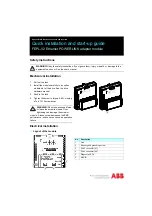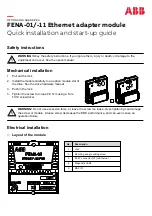
EW089.309_en
–
rev.B
Gas detection Control Unit
–
UCE1
27/04/2021
Gas detection systems for industrial environments
3 of 4
Detector failure test
Simulate a failure in the detector as follows:
-
disconnect the cable of the detector and verify the following
alerts:
-
reconnect the detector and press the “Reset/Test” to return the
control unit to normal operating mode, making the sure the
conditions of the various interfaces are reset
Normal operation
This is the normal operating phase of the control unit during which
both gas alarm monitoring and self-testing of the instrument
(detector) and the system (control unit) are active. During this
phase, where there are no alarms and/or abnormalities, the
control unit display shows the following:
When dangerous concentrations of gas are detected, the control
unit enters the gas alarm phase and carries out the following
operations:
Once the gas alarm condition is normalised, the control unit needs
to be reset to its normal operating status. Press the “Reset/Test
button on the front of the control unit to reset it.
If there are abnormalities (detector and/or control unit), the
control unit will show the following display:
Once the failure is fixed, the control unit needs to be reset to its
normal
operating status. Press the “Reset/Test button on the front
of the control unit to reset it.
Caution:
it is advisable to repeat the operating test at least
once a year, or after a prolonged period of
stoppage and in any case, every time the detector
is replaced.
Caution
The average lifetime of the URx13 and
URx20/21.. detectors is 5 years from installation
date. They must be replaced before the end of
the 5th year of use. The average lifetime of
detectors is calculated for use in a typical
environment, normally free from polluting agents
(gases, solvents etc.). More frequent and higher
concentrations
of
these
substances
can
accelerate the normal oxidisation process of the
sensing element, subsequently shortening its
lifetime.
GAS ALARM
If an alarm signals a gas leak or the presence of carbon
monoxide, proceed as follows:
-
put out flames and switch off all gas equipment
-
do not for any reason switch on or off lights or any electrical
equipment
-
open doors and windows to air the environment
-
look for and eliminate the cause of the alarm. If this is not
possible, leave the building and contact emergency services
from outside.
ENVIRONMENTAL COMPATIBILITY AND DISPOSAL
This product has been designed and constructed
using materials and processes that take into account
the environmental issue. Refer to the following notes for disposal
of the product at the end of its working life, or when it is replaced:
-
for disposal purposes, this product is classified as an electric
and electronic device: do not dispose of it with normal
household waste, in particular as regards the printed circuit
-
comply with all local laws in force
-
as far as possible reuse basic materials to keep environmental
impact to a minimum
-
use local depots and waste recycling companies, or contact the
supplier or manufacturer to return used products or to ask for
information on environmental compatibility and waste disposal
-
the product packaging can be reused. Keep it for future use or
to return the product to the supplier.
TROUBLESHOOTING
Problem
Possible cause
NC valve does not open
-
Valve not connected
-
Alarm in progress
-
Detector warm-up phase in
progress
-
Defective detector
-
Presence of failure
NO valve does not close
-
Valve not connected
-
Connection cables cut
-
No alarm active
“Reset/Test” button does not
reset to initial conditions
-
Alarm in progress
-
Failure occurring in control
unit
Sensor in alarm immediately
after the end of the preheating
phase
During the preheating phase,
the sensor did not reach
thermal stabilization.
Wait further minutes and then
reset the alarm with the "Reset
/ Test" button
Interface
Positive logic
Negative logic
Detector Failure LED
Yellow
Off
On
Alarm buzzer
Intermittent
sound
Intermittent sound
Failure output
Off
On
Interface
Positive logic
Negative logic
Power supply LED
Green
On
On
Failure LED
Yellow
On
Off
Gas alarm LED
Red
On
Off
Alarm buzzer
No sound
No sound
Alarm relay
Energised
De-energised
Failure output
On
Off
Interface
Positive logic
Negative logic
Detector alarm LED
Red
Off
On
Alarm buzzer
Continuous
sound
Continuous sound
Alarm relay
De-energised
Energised
(permanently
or
pulsed depending
on E2)
Failure output
On
Off
Interface
Positive logic
Negative logic
Failure LED
Yellow
Off
On
Alarm buzzer
Intermittent
sound
Intermittent
sound
Failure output
On
Off






















